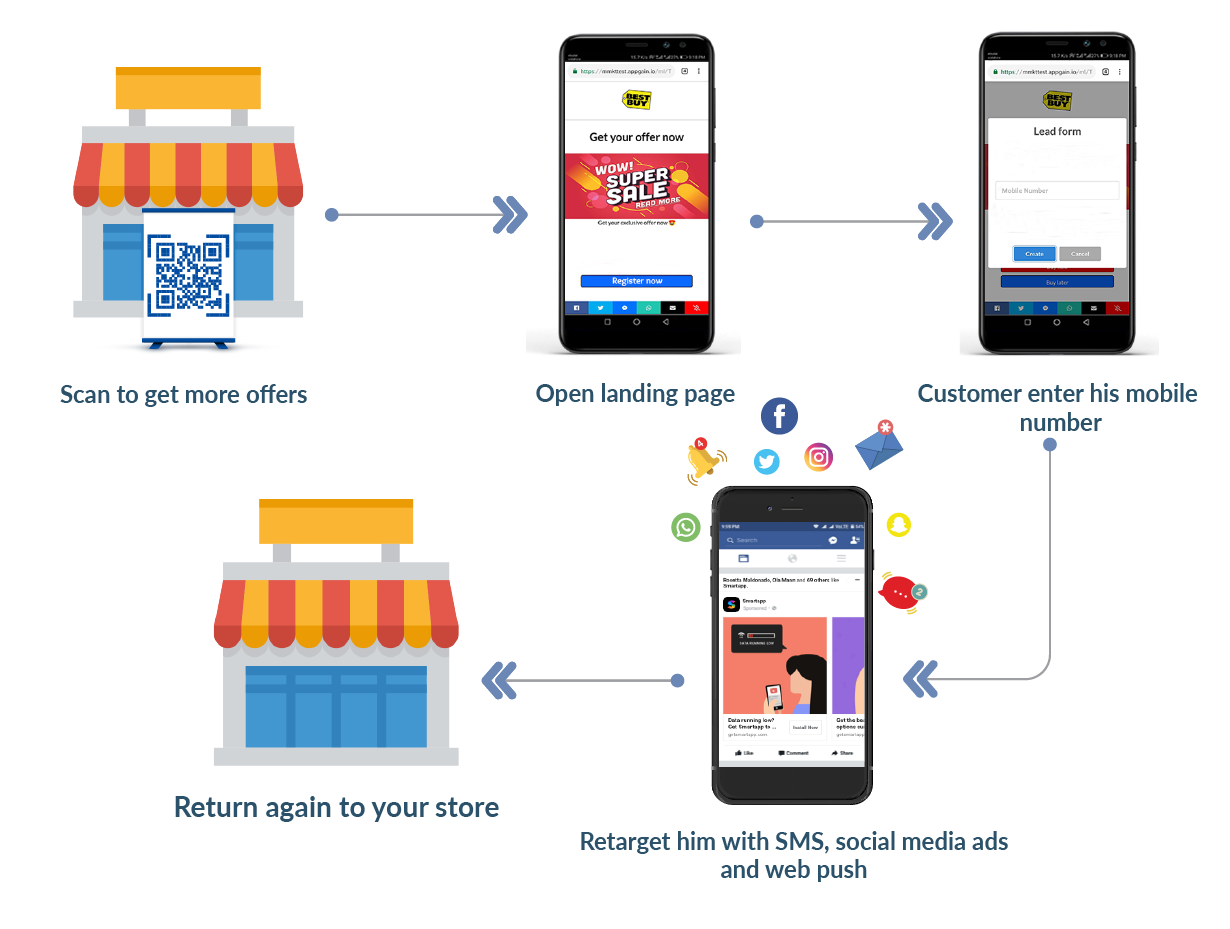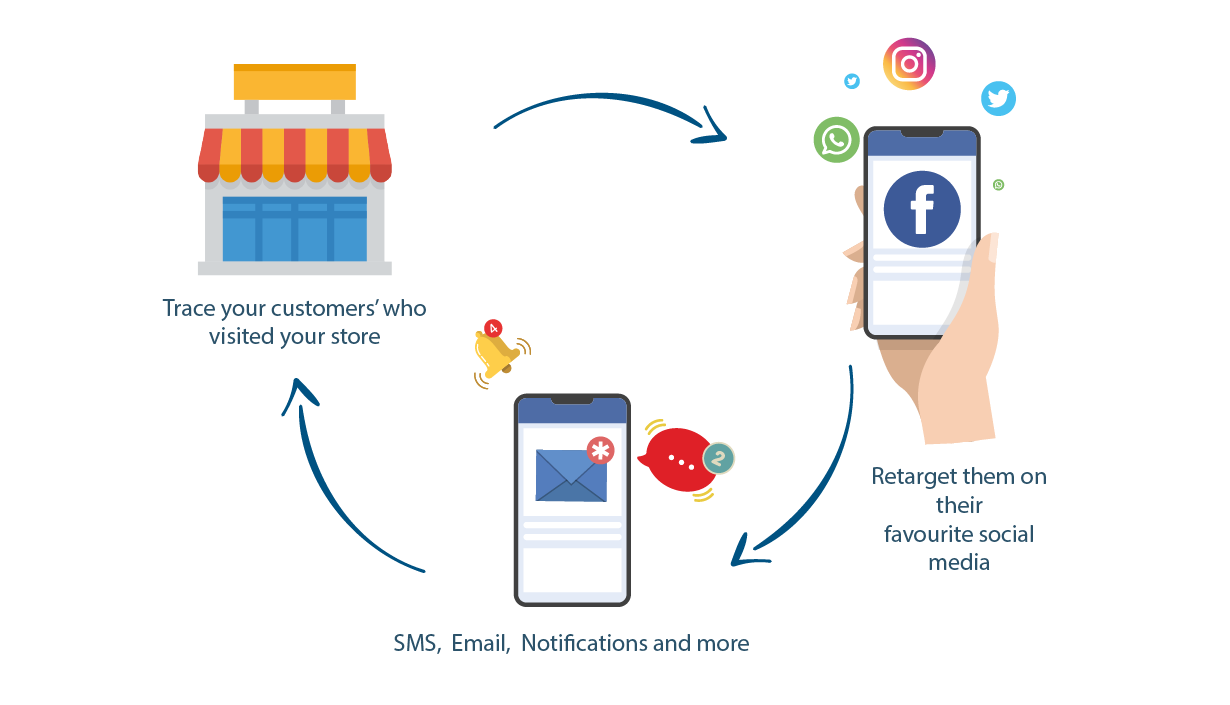As a retailer, you know how hard it’s to craft a retail marketing strategy and how to keep your customers coming back to your store, people spend millions of dollars on retail marketing ideas, but they tend to be broad, not targeted and not measurable.
So retailers needed to come up with something more productive, measurable and not spammy, a new retail marketing solution that would help change how retailers approach their customers, so they developed “Retargeting”!
We’re going to explain to you in this blog:
- What’s retargeting?
- How can it help you as a retailer?
- Why should you invest in retargeting?
- Why mobile marketing is harder and how to work around it
- Other types of remarketing
- How to personalize retargeting
- Are Retargeting and Remarketing the Same Thing?
And much more!
What’s Retargeting for retailers?
In simple terms, Retargeting is following or tracking your user’s journey in your space whether it’s a retail store or an online shop, to know what is he interested in
If he didn’t convert, you show him ads about your product, and if he converted you show him either similar criteria or other products that might grab his attention!
Because retailers will always be retailers and retail marketing strategy would be the same offline and online, people don’t know they need that sparky thing until you show it to them!
That’s why retargeting effective in case:
- your customer purchased your product that way you make him want to buy more,
- or he didn’t convert that way you encourage him to complete the purchase; then you show him other exciting things to get his attention

So retargeting is all about targeting the right audience, relevant people!
That’s why retailers marketers are putting more researches and development.
retail digital marketing is a developing subject that always generates marketing ideas for retail stores
Why should you use retargeting?
As I’ve shown, retargeting has been a successful retail marketing strategy that works, but we wanted to be clear about why retargeting is helpful for you!
- First of all, retargeting helps to grow your brand when people search for let’s say a coffee machine, and they visit your website but don’t buy.
They see your brand when they’re surfing the internet or their favorite social media; you pop up to them letting them know you’re what they’re looking for!
- Secondly, you probably don’t land the first sell right out of the bat right? That’s why retargeting is an excellent second opportunity for you to make up for the missed revenue that you missed the first time!
Are Retargeting and Remarketing the Same Thing?
Simply no, but the main difference is that retargeting is mostly about serving ads to potential customers based on cookies while remarketing is usually based on email.
- Remarketing works by collecting the information of users and creating lists, which are used later to send sales emails.
- Retargeting and remarketing are both effective methods in their own right, yet a combination of both may be the best strategy to boost your digital marketing activity and improve your bottom line
![]()
But what’s the key difference?
Well, they are both retail marketing strategy, but the main difference is that retargeting is more about tracking your user with a tracking code like Google tag manager, or Facebook pixel and retarget them with a product that they might want or a genre of products that they might interest him.
And remarketing is more of an Email type of marketing, like cold emailing, but the customer isn’t cold.
He’s warm, and your sales guys reach out to him with an email to know why didn’t he buy or is he interested or not?
But I’m more of the person who probably names them the same thing, so Let’s consider them as one thing shall we!
Retargeting on mobile
Well, mobile retargeting isn’t an easy thing, because while you can track people with cookies and google tag manager easily on the desktop.
It’s what every site do because every website uses cookies nowadays, but on mobile, it’s not as easy as just putting a cookie, because they usually don’t use a browser to do things!
Because everyone uses native application for more straightforward navigation on your smartphone and not their browsers!

But everything has a workaround, and retailers know that well, so the retail marketing solution providers made a workaround that would let retailers retarget without an app.
- A customer sees an in-store at your retail store with a QR code in it.
- He scans and opens the offer landing page.
- Within the landing page, you put the tracking code like GTM or facebook pixel.
- And just like that, you retarget your in-store customer online to drive them back to your store!
And that’s only one scenario of retail digital marketing on mobile!
What about other retargeting channels?
Today, there are many retail marketing campaigns on different digital channels to reach an audience. Each of them has various advantages and disadvantages.
If you can harmoniously combine your audience research efforts with targeting for these channels, you are going to be more likely to reap the rewards for your work.
Today, some of the marketing automation platforms can either integrate with others or outright include all the steps of your remarketing journey in their toolkit. Make sure you are using one of those.
If, however, you want to facilitate this coordination manually, make sure you do your work very thoroughly so things will not get “lost in translation.” Also, know that you will spend lots of effort, time, and hence money in getting this right.
- SMS messages
- Emails
- App push notifications
- Web push notifications
All have their specific pros/cons. App push notifications, for example, have some of the highest engagement and conversion rates, but they require an app to be installed on the targeted users’ device beforehand. Web push notifications, however, does not have this requirement and can work even on desktop/laptop computers.
Another thing to take care of is that you should avoid retargeting the same person on lots of channels at the same time. Choose the best one fitting for their case, and stick with it. Contacting the same person on five different channels is a textbook definition of spam.
Finally, no need to feel like all your retargeting needs to be through digital channels. You can use offline, physical media too. Let’s say that your audience frequents a particular venue. Why not print some stickers with QR codes of your campaign, along with an attractive offer on them?
Retargeting the right audience!
It is easy to retarget anyone and everyone who has ever been in your retail marketing audience. It may or may not work for every one of them. But hopefully, some of them will be interested, right?
While that is true, this approach also leads to increased marketing costs, as well as the risk of being seen spammy by the people you retarget.
A smarter approach will be to pick those who are interested in the campaign but didn’t go ahead with it yet.
Other examples of good retargeting audiences can be:
- People who have registered an account on your campaign’s site, but haven’t started using it.
- People who filled a shopping cart but abandoned it.
- People who were interested in similar campaigns/products before.
- Finally, people who are using or have used competitors.
This way, you will be able to target people who are likely to be interested in what you have to say them. The conversion rates of your retargeting efforts will be much higher this way.
Another side to choosing the right audience for retargeting is that just going shotgun on selecting people to retarget can, and often does result in some damage on the brand identity. None of us enjoy it when it is like “oh, great, another random marketing message pestering me for something I am not too interested in.”
How to approach your customers?!
Something to the effect of “pssst! Why haven’t you still bought this cool thing yet?! You know you want it!” may not necessarily be the best way to go.
We are, after all, end users too, be honest and ask yourself, what do you usually do with those?
It tends to go like:
“Mmm… yeah, right…” (clicks delete).
We need to put the smart in smart retargeting. Do a bit of due diligence and find out a few reasons why the users who were on the line decided not to go past it. Construct your messages with that information. Play on what they liked, reassure them against what they may not have wanted.
Having composed a single message is too old-school. Make sure that you at least have a few that you crafted for each persona.
If you can get the user to feel like they are addressed in person, rather than as a part of a mailing list, your chances of persuading them will be much, much higher.
Make sure the message is engaging, and persuade them that you are selling a solution or something that they desire, and not just trying to move more copies out of your stock, and more dollars out of their pockets.
Retail retargeting
So you must be thinking now as a retailer, now I have the information I have to start retargeting, how do I set it up in motion? What is the retail marketing plan that you would follow to ensure smooth retargeting?
Well, you as a retailer your main focus would be on bringing back your customers to your store, one of the in-store promotion ideas is
- Create an offer’s landing page and setup GTM and Facebook Pixel in it
- Capture your customers’ online presence as ID, that way you could retarget them
- Start showing your visitors relevant ads to your product
And now you wait for them to naturally convert after they’ve seen your Ads on their favorite social media.
And while Tracking codes are the most popular retargeting retail marketing technique out there’re also Retargeting but notifications
- Like the steps above you direct your user to a landing page
- But this time to invite him to subscribe to your notification
- And then you target him without any app via web push notifications!
- Get creative with your notifications, use emojis, and limited offers for your notifications subscribers to encourage them to buy!
Conclusion
So as a conclusion to this article, we hope that you’ve answered all of your questions about Retail marketing, and their strategy.
Because as a retailer you must think about your customer and what they want, and what the best way to reach them, not about how to spam them with your products!
Retargeting is more of a strategy for retail, retargeting isn’t a linear equation that you would put, and it’ll start working, it’s more about how do you manage your different kinds of retail strategies!
Is mobile the new way of remarketing? Because everyone has a smartphone now, and we’re migrating from just Desktop computers to smartphones.
What’s the workaround if you’re not a retailer with an app or you need to implement another remarketing way that’s less complex and easier to manage.
What to look for when you want to get your remarketing going through a 3rd app platform, how to choose the right one?
And why in the first place do you go with remarketing and not just the regular marketing campaign, what are the differences that make you more of a remarketing guy after of course doing marketing, but not wasting your money on it
Still, got questions? Do not hesitate to reach out and Contact Us! Request Demo now.
